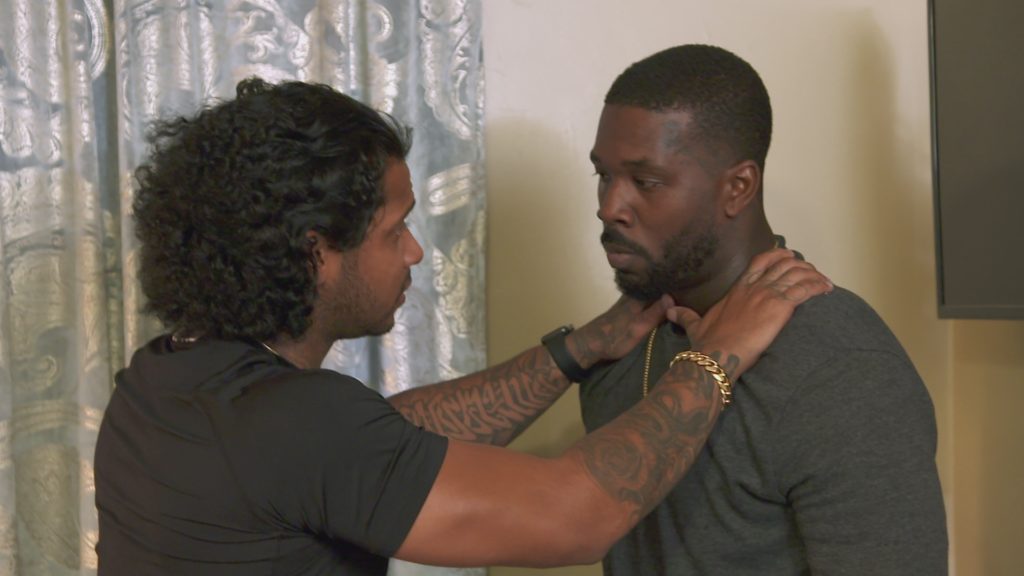- Unique Factors
- Factors that negatively impact Black mental health include racism, systemic oppression (like the criminal justice system or housing discrimination), and stigma (the belief that struggling with mental health is a sign of weakness).
- Open Conversations
- Show Black people having conversations about mental health in everyday settings to help counter the fear of judgment and make speaking up feel less intimidating.
- Treatment and Coping Strategies
- Depict Black people advocating for themselves, accessing treatment, and engaging with healthy coping strategies on-screen.
Storytelling Tips
Diversify Representation
- Look for opportunities to highlight ways the Black community can address mental health without over-defining mental health challenges. For example, you can simply show someone having an open conversation about their struggles without spotlighting a deficiency.
- Men of color are less likely to seek help for mental health struggles in part because systemic racism and violence have required them to protect themselves and avoid any signs of perceived weakness that could compromise their safety. Feeling labeled as more susceptible to mental health challenges is unlikely to engage them in talking about or seeking help for difficult feelings. In fact, it might have the opposite effect.
Portray a Range of Mental Health Experiences
- Tell stories about Black people experiencing (and coping with) a range of mental health challenges, from everyday difficulties to more serious struggles.
- We rarely get to see stories about Black people experiencing the full continuum of mental health challenges. This lack of conversation could be a key reason — in addition to lack of access to quality care — that more Black people aren’t reaching out for help and receiving effective treatment.

Show Conversations About Mental Health and Help-Seeking
- Model conversations about mental health happening in everyday settings to make these conversations feel less intimidating and more accessible.
- The belief that talking about emotional struggles is a sign of weakness and a resistance to having those conversations can be a risk factor for the Black community.
- In particular, it’s important to shed light on the realities of suicide within the Black community — including the rise among Black youth. We rarely hear Black voices talking about lived experience coping with thoughts of suicide, but this can be a powerful tool in reducing barriers to speaking up and getting help.
Stories that show conversations about mental health happening in everyday settings can make viewers more comfortable having those conversations in their own lives.
Depict Effective, Realistic Help-Seeking and Treatment
- Show Black people advocating for themselves, accessing culturally competent services, and engaging with healthy coping strategies.
- For example, participating in religion/spirituality, leaning into social support networks, and showing humor as a way to laugh and find joy amidst difficult situations are coping strategies that have traditionally been effective within the Black community.
- A recent ViacomCBS & Well Being Trust survey indicated that viewers are more likely to seek resources themselves if they see a mental healthcare provider on-screen who looks like them or comes from the same background. It’s important to show treatment options and mental health professionals that reflect the diverse backgrounds and experiences of viewers, particularly for communities that may have cultural or systemic barriers to help-seeking.
Highlight the Power of Coping Skills and Self-Care
- Think about the types of self-care that are realistic and accessible to your characters or cast members and highlight them in your story. Self-care practices can be an effective tool to support mental health, so it’s helpful when stories can make self-care feel relatable to Black viewers.
Move Past Stereotypes
- It’s OK — and important — to show Black women struggling, coping, and reaching out for support. Storylines that show Black women only being strong can be problematic as they play into the Superwoman stereotype that often makes it difficult for Black women to prioritize their mental health.
Snapshot
Black people experience mental health conditions at similar rates to the general population, but are less likely to seek or receive professional support (including medication and outpatient therapy). In 2018, over half of Black Americans with serious mental illness did not receive treatment, and nearly 90% of Black people with substance use disorder did not receive treatment.
When care is received, it’s generally poorer quality and often not culturally competent, and Black people with serious mental illnesses are more likely to face incarceration than people of other races.
When care is received, it’s generally poorer quality and often not culturally competent, and Black people with serious mental illnesses are more likely to face incarceration than people of other races.
Black people are often left out of conversations about suicide, but recent increases in suicide rates among Black youth are highlighting an urgent need for more research, targeted prevention efforts, and culturally competent mental health care.
Factors that negatively impact Black mental health that should be explored in storytelling include:
- Racism: The repeated experiences of Black people being treated as less than because of their race significantly impacts mental health. Research has shown that racism is associated with mental health concerns including depression, anxiety, and post traumatic stress disorder. Studies have also shown a connection between racism and suicidal thoughts in the Black community.
- Systemic Oppression: Multiple systems in the United States exist in ways that are oppressive and unjust to Black people, including the criminal justice system, housing, and healthcare. The disparities that exist within these systems can contribute to poorer mental health.
- Stigma: There is a longstanding belief in the Black community that mental health is a taboo topic that should not be discussed openly. Struggling with a mental health concern is often seen as a sign of weakness, making it less likely that members of the Black community will reach out for help.


